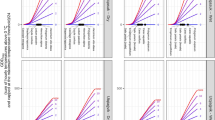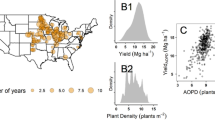Abstract
THE optimum plant density for a crop often decreases as the climate becomes drier. The usual explanation for this, that wider spacing of plants decreases competition for water1,2, overlooks the possible effect of other climatic factors in the size of individual plants. Thus data we have collected from maize density experiments suggest that smaller densities are used for this crop in relatively dry North-east Rhodesia than in relatively moist central England because plants grow much larger in Rhodesia than in England, rather than because water is in comparatively short supply in Rhodesia.
This is a preview of subscription content, access via your institution
Access options
Subscribe to this journal
Receive 51 print issues and online access
$199.00 per year
only $3.90 per issue
Buy this article
- Purchase on Springer Link
- Instant access to full article PDF
Prices may be subject to local taxes which are calculated during checkout
Similar content being viewed by others
References
Hudson, H. G., J. Agric. Sci., 31, 138 (1941).
Donald, C. M., Adv. Agron., 15, 1 (1963).
Allison, J. C. S., and Watson, D. J., Ann. Bot., 30, 365 (1966).
Bunting, E. S., Outl. Agric., 5, 104 (1966).
Author information
Authors and Affiliations
Rights and permissions
About this article
Cite this article
ALLISON, J., EDDOWES, M. Climate and Optimum Plant Density for Maize. Nature 220, 1343–1344 (1968). https://doi.org/10.1038/2201343a0
Received:
Issue Date:
DOI: https://doi.org/10.1038/2201343a0
Comments
By submitting a comment you agree to abide by our Terms and Community Guidelines. If you find something abusive or that does not comply with our terms or guidelines please flag it as inappropriate.



